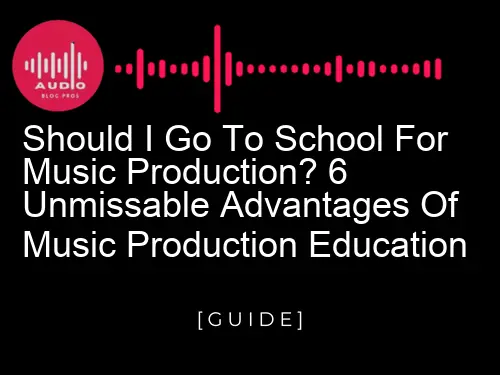Have you ever asked yourself “Should I Go to School for Music Production”? Are you a music lover who dreams of working in the industry? Are you uncertain whether or not to take the plunge and enroll in a music production school program? The answer may surprise you. In this post, we’ll explore the six unmissable advantages of music production education that will help you make a decision. Read on to find out what these are and to make an informed decision about your future.
What Music Production Education Can Offer You
When you attend a music production school, you gain access to a wide range of creative tools and technologies. You may be able to develop new skills that would otherwise be difficult or impossible to learn on your own. And because the field of music production is constantly evolving, an education in this area will always give you an edge when looking for work. Additionally, attending a music production school can provide you with contacts and networks that can lead to jobs in the industry. So if you’re interested in pursuing a career in music production, consider attending one of these schools!
Developing Your Creative Skills in Music Production
One of the most important benefits of music production education is the creative freedom it provides. In music production, you’ll be able to explore a wide range of sounds and styles, learn how to work with different software programs, and develop your own sound.
Music production education also teaches you how to use the latest technology and techniques, which can give you an edge in the music production job market. In addition, many music production schools offer excellent networking opportunities, which can help you connect with industry professionals.
Music production education can also help you learn from experienced instructors and mentors. These professionals can provide you with invaluable advice and guidance as you continue your music production journey.
The benefits of attending a music production school are numerous and include developing your creative skills, gaining an edge in the music production job market, and learning from experienced professionals. So if you’re interested in learning more about music production, be sure to consider attending a school that offers this type of education.

Exploring the Latest Technology and Techniques
The main advantage of going to a music production school is that you will be able to learn the latest techniques and technologies in the field. Additionally, many schools have long term programs that allow you to develop your creative skills in a variety of ways. In addition, most schools offer excellent networking opportunities with industry professionals.

Networking Opportunities with Industry Professionals
Opportunities to Build Professional Contacts
One of the most important things that any music production student can do is to network with individuals in the industry. There are many ways to do this, but one of the best ways is to attend music industry conferences. These events offer a great opportunity to meet other professionals and make valuable connections. Additionally, they also provide an environment where students can learn from some of the top professionals in the field. Overall, these conferences are an essential part of any music production education.
Made Connections with Industry Influencers
Music production education offers students countless opportunities to build professional contacts and network with industry professionals. With the recent growth of music production as a profession, gaining relationships with people in the music industry is key for anyone looking to pursue this path.
One way to connect with professionals in the music industry is attend music industry events. These events feature both local and international speakers who share valuable information about the music industry. Additionally, networking opportunities at these events are endless; you can find contact information for many influential people in the music business there. Additionally, many online communities cater to musicians and producers, so it’s always worth checking them out.
Making connections with producers and musicians is also important for those who want to learn more about production techniques. Many producers and musicians are happy to share their knowledge and offer advice. In addition, many music production schools offer coursework that focuses on networking with industry professionals. This type of coursework gives students the opportunity to build relationships with people in the music industry and learn from the best producers and musicians.
Making Contact with Music Production Companies
Music production is a growing industry that offers many opportunities for networking and building relationships with industry professionals. If you’re interested in pursuing a music production career, it’s important to make connections with people who can help guide and support your development.
One way to make connections is to attend music production events and conferences. These events provide an opportunity to meet industry professionals and learn about the latest trends in the music production industry. Additionally, many music production companies offer scholarships and grants for students interested in pursuing music production degrees.
Another way to make connections is to join online music production communities. These communities provide a forum for music producers to share their work and discuss challenges they’ve faced while producing music. Membership in these communities can also lead to opportunities to work with industry professionals in future projects.
Finally, it’s important to network with people who share your interests in music production. You can find these individuals by attending music festivals and concerts, watching music related TV shows, or reading music blogs. By building relationships with like-minded people, you’ll be more likely to find opportunities and resources when you need them most.
Expand Your Social Network in the Music Business
If you’re thinking about pursuing music production education, you should be aware of the many networking opportunities that are available to you. Not only will attending music production school provide you with the skills and knowledge necessary to start your own music production company, but it will also give you access to industry professionals.
By attending music production school, you’ll be able to make connections with people in the music industry. This will allow you to learn from the best and gain valuable experience. In addition, by joining music industry organizations, such as the American Music Producer’s Association (AMPAS), you’ll be able to build relationships with other professionals. These connections can help you find work in the music industry or help you find new opportunities for your music production company.
When networking in the music industry, it’s important to be proactive. You don’t want to wait for someone to come to you; you should be reaching out and building relationships. There are many ways to network in the music business, including attending music industry events, participating in online forums, and meeting other professionals through social media or professional networking websites.

Gaining an Edge in the Music Production Job Market
One of the many reasons to attend a music production school is the opportunity to develop creative skills in music production. The coursework will teach you how to use technology and sound effects, mix tracks, create beats, and more. In addition, music production education often includes sessions where you can record your own material with industry professionals. As a result, attending a music production school can give you an edge over those who don’t have this type of education.
Learning from Experienced Instructors and Mentors
If you’re interested in pursuing a career in music production, there are many benefits to attending a music production school. Music production education can give you the skills and knowledge needed to create music, sound effects, and audio tracks for films, video games, and other media.
Music production education can also help you develop your creative skills. In music production, you’ll learn how to use software such as Pro Tools and Logic to create professional-grade recordings. You’ll also learn how to mix and master audio tracks, create sound effects, and produce music for film, video games, and other media.
Music production education can also give you an edge in the job market. Many music production jobs require a degree or certification in music production. However, many entry-level positions in the music production industry are available without a degree or certification.
Music production education can also provide you with experience working with industry professionals. Many music production schools offer internship opportunities that allow you to work with experienced professionals in the music industry. This experience can help you develop your skills and knowledge in the music production field.
Music production education can provide you with the skills and knowledge needed to create high-quality audio tracks for film, video games, and other media. If you’re interested in pursuing a career in music production, attending a music production school is a great option.

How to Choose the Right Music Production School for You
Analyze and Prioritize Your Personal Learning Needs
When considering whether or not to pursue music production education, it’s important to first identify your personal learning needs.
Each student has different strengths and weaknesses, which means that the type of coursework and instruction required for success will vary depending on who you are as a musician and producer.
Below are six key factors to consider when choosing the right music production school for you:
- Your level of musical experience: Newbie or experienced? Some courses require no musical background whatsoever, while others may require some prior knowledge of how to play an instrument or write songs. If you’re relatively new to music production, start by exploring online resources like YouTube tutorials before considering enrolling in formal lessons or classes.
- Your work ethic: Are you willing to work hard in class and practice on your own? Without the proper amount of effort, any music production education is going to be difficult even from world-renowned schools.
- Your creativity and innovation: Do you take ideas seriously and are you able to think outside the box when it comes to creating songs or beats? Many top music production educators encourage their students to explore new sounds, experiment with unusual instruments, and try out unorthodox methods when producing music.
- How much time you’re willing to devote each week: A lot of formal music production classes require at least eight hours a week of attendance, although some schools may offer more flexible scheduling options. If you want to stay afloat while balancing other commitments, consider finding a school that offers online or hybrid classes that can be completed on the weekends or in between other jobs.
- Your financial stability: Each school has different tuition and class fees, so it’s important to determine what you can realistically afford before making any commitments. Some schools offer scholarships and funding options, while others have low startup costs but higher annual fees.
- Your work schedule: Will you be able to attend during traditional school hours? Are you available for weekend classes or evening sessions? Many music production educators are available for consultation outside of scheduled classes, so it may be possible to complete some coursework online during the daytime and then meet with a teacher in person at night.
Research Accreditation and Ranking of Music Production Schools
There are many factors to consider when choosing the right music production school for you. You’ll want to research accreditation and ranking of schools so that you can ensure you’re picking an institution with top-tier credentials.
Some things to keep in mind when researching music production schools:
- Which type of school will fit your goals? Do you want an accredited music production program, a conservatory, or a college?
- How much equipment do you need? Will attending a private school with more resources be worth the price tag?
- Do you have any prior experience in music production? If not, will attending an accredited school be sufficient training?
Explore Potential Job Opportunities After Graduation
After researching music production schools and weighing the pros and cons of attending one, you may be wondering what kind of career opportunities are available to students who graduate with a degree in music production.
There is no one-size-fits-all answer to this question, as the best path towards success will vary depending on your individual skills and interests. However, some general advice that may be useful when considering a music production school is to think about what type of job you want after graduation. Below are six important advantages to attending a music production school:
-
Music Production Education May Improve Your Job Prospects. The popularity of music streaming services like Spotify has led to an increased demand for sound engineers, mixers, and producers. According to the Bureau of Labor Statistics (BLS), employment opportunities for music production professionals are expected to grow by 17% between 2016 and 2026, which is much faster than the average for all occupations. This means that if you want to pursue a music production career, a degree from a reputable school is a must.
-
Music Production Education May Improve Your Earning Potential. Although there is no one definitive way to measure earnings potential after graduation, many music production professionals report earning higher salaries than those who do not have a degree in music production. In fact, a 2016 study by the online job marketplace Indeed found that music production professionals earn an average salary of $60,000 per year, which is significantly higher than the average salary for all occupations.
-
Music Production Education May Lead to a Career in Sound Design. Although music production education does not always lead to a career as a sound engineer, many students end up working in this field after graduation. In fact, according to the BLS, employment opportunities for sound engineers are expected to grow by 26% between 2016 and 2026. This is due in large part to an increasing demand for sound effects and audio editing software, both of which are essential elements of sound design.
-
Music Production Education May Lead to a Career in Music Publishing. Another area where music production education can lead you is into the world of music publishing. As digital downloads have replaced physical albums as the main way people consume music, there is an increased need for music publishers who can help artists manage their music rights. According to the BLS, employment opportunities for music publishers are expected to grow by 26% between 2016 and 2026.
-
Music Production Education May Lead to a Career in Music Industry Management. Although music production education does not always lead to a career as a music industry manager, many students end up working in this field after graduation. In fact, according to the BLS, employment opportunities for music industry managers are expected to grow by 27% between 2016 and 2026. This is due in large part to an increasing demand for music marketing, music distribution, and music licensing services.
-
Music Production Education May Lead to a Career in Music Technology. Although music production education does not always lead to a career in music technology, many students end up working in this field after graduation. In fact, according to the BLS, employment opportunities for music technology professionals are expected to grow by 28% between 2016 and 2026. This is due in large part to the growing demand for audio processing software, sound effects libraries, and digital audio workstations.
Overall, it is important to consider what kind of career you want after graduating from a music production school before making any decisions about which one to attend. However, based on the six advantages listed above, attending a reputable music production school may be the best path forward if you want to pursue a career in sound engineering, music publishing, music industry management, or music technology.
Assess Tuition Fees and Financial Aid Packages
When choosing a music production school, there are a few factors to consider. The first is whether you want a full-time or part-time program. Full-time programs offer more opportunities for hands-on learning, whereas part-time programs may be more suited for students who have jobs and other responsibilities.
Next, it’s important to decide what type of music production education you’re looking for. If you already have some music production experience, then a certificate program might be the best option for you. These programs offer comprehensive training in all aspects of music production, from recording and mixing to songwriting and marketing. On the other hand, if you don’t have any prior music production experience, then a degree program might be better suited for you. These programs offer more in-depth training and are generally more academically rigorous.
One final factor to consider is tuition fees. In addition to program costs, tuition can vary substantially based on the school you choose. To get an estimate of potential tuition fees, it’s important to look at the school’s website and compare prices for similar programs. In addition, many schools offer financial assistance in the form of scholarships and grants.

Making the Most of Your Music Production Education Experience
Music production education can offer you a number of unique advantages when it comes to finding a music production job. Not only will you have developed creative skills and knowledge in music production, but you will also be well-versed in the latest technology and techniques. Additionally, attending a music production school can provide you with networking opportunities with industry professionals. Finally, music production education can also help you learn from experienced instructors and mentors.
The Benefits of Attending a Music Production School
The benefits of attending a music production school are many. Music production education can give you the skills and knowledge needed to create music professionally. Music production education can also help you develop creative skills, explore new technology and techniques, network with industry professionals, and gain an edge in the music production job market.
Music production education can be an invaluable resource for anyone looking to gain the skills and knowledge necessary to become a successful music producer. With the right school, you can develop your creative skills, explore the latest technology and techniques, network with industry professionals, and gain an edge in the job market. Whether you’re just starting out or looking to take your career to the next level, music production education can provide you with the tools and resources you need to succeed. To learn more about music production education and other related topics, be sure to check out our other content.

